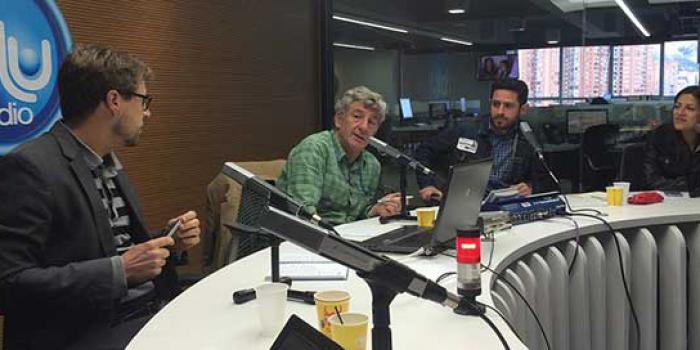
Victims who are abroad, acknowledged for the first time
‘This is the first time that the Colombian State acknowledges victims not only stayed in national territory, but also had to leave the country,’ said Zully Laverde, coordinator of the Victims Unit’s team focused on fellow citizens victims abroad, during her intervention in the program Encuentros Blu, in Blu Radio, last Sunday.

‘This is the first time that the Colombian State acknowledges victims not only stayed in national territory, but also had to leave the country,’ said Zully Laverde, coordinator of the Victims Unit’s team focused on fellow citizens victims abroad, during her intervention in the program Encuentros Blu, in Blu Radio, last Sunday.
Within the framework of the World Refugee Day on Saturday, Laverde said that not all the refugees are necessarily victims of the internal armed conflict, and explained the route to be included in the Single Registry of Victims. So, those who consider themselves victims and live outside the country can go to one of the more of 100 Colombian consulates and submit their declaration, which will be sent to the Victims Unit in order to assess its inclusion or not in the registry.
By the 1st of June 2015, Colombian consulates in 36 countries had received 2,239 applications for inclusion in the Single Registry of Victims, which allowed the inclusion of 4,312 victims who had suffered forced displacement, threats, and murder, among others. The countries where most applications were submitted are the United States (424), Canada (423), Ecuador (304), Spain (282) and Venezuela (258).
Javier Higuera, of the Ministry of Foreign Affairs, said that ‘there is a clear and defined policy in the Colombian Chancellery in order to comply with the responsibility established by Law 1448, and we have done it since 2012.’ He also reminded that public servers in the consulates have to complete a training on these aspects, and mentioned the spreading mechanisms that have been used.
Juan Carlos Villamizar, member of the ‘Foro Internacional de Víctimas’ (‘International Forum of Victims’), shared his experience as 13-year refugee in Spain, and his returning to Colombia three months ago. This member of the Patriotic Union (a political party known as ‘UP’) had to flee the country due to the constant threats he received. ‘My case is one of the many of those who are threatened because they say what they think,’ he stated.
‘When you’ve left the country and you return, you are no longer the same. That condition goes with you, and changes your imaginary,’ he said during the program. About the feeling of alienation or estrangement, he highlighted a sentence written in the documentation delivered to refugees, something of the sort of ‘This passport is valid for all countries but the one of origin of its owner.’ According to Villamizar, this is feels like losing citizenship, with a ‘feeling of being incarcerated in the rest of the world.’ In his case, the idea of returning came ‘when the UP was given back its legal capacity.’ He says he is still adapting to Colombia again. ‘The kindest thing is when I see people supporting the peace process.’
When someone forcibly flees his/her land, ‘there are really severe damages,’ explained Marco Romero, director of the Consultoría Para los Derechos Humanos y el Desplazamiento Forzado (CODHES), an organization that documents ‘the situation of forced displacement in the country and defend displaced peoples’ rights, among them, those who had to leave the country.’
Villamizar believes that those who return have seen other models of society, other forms of resolving problems. ‘If Colombia gets to see refuge as an opportunity to reinforce the country that has to be rebuilt, it would be very powerful,’ he added.
Marco Romero assured that some of those returning to Colombia have experienced a ‘process of personal growth, have important contributions to society.’ However, not everyone is that lucky, and many cannot return. Romero appealed to solidarity and take care of the situation of our fellow citizens abroad.
Martin Gottwald, deputy representative at UNHCR in Colombia, said that this international organization ‘helps governments and refugees to find a durable solution’, and that, according to UNHCR, 87% of refugees are received in developing countries. This is why, they seek to have a balance ‘between domestic interests and humanitarian needs.’
- For more information (in Spanish), please visit: http://www.unidadvictimas.gov.co/es/v%C3%ADctimas-en-el-exterior/por-primera-vez-se-reconocen-las-v%C3%ADctimas-en-el-exterior/13291






